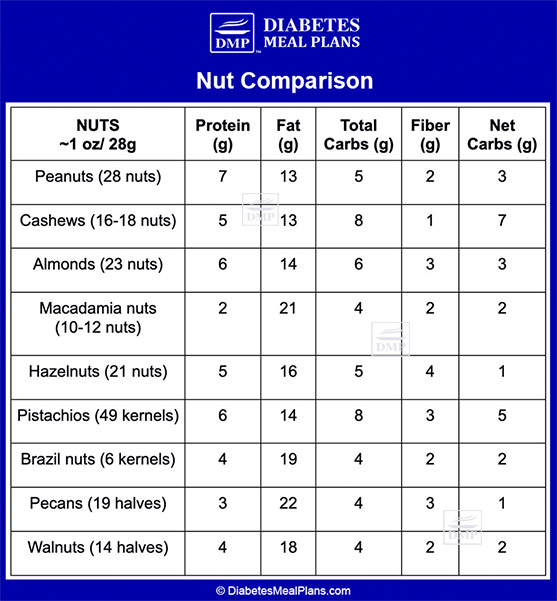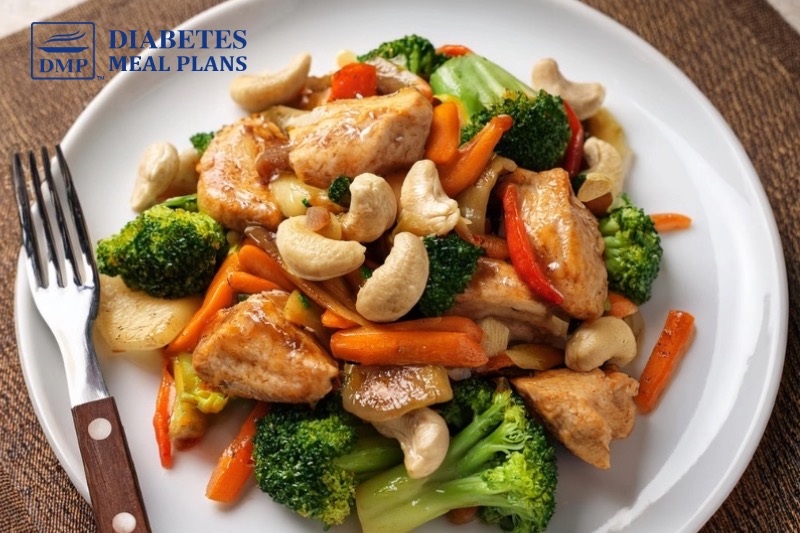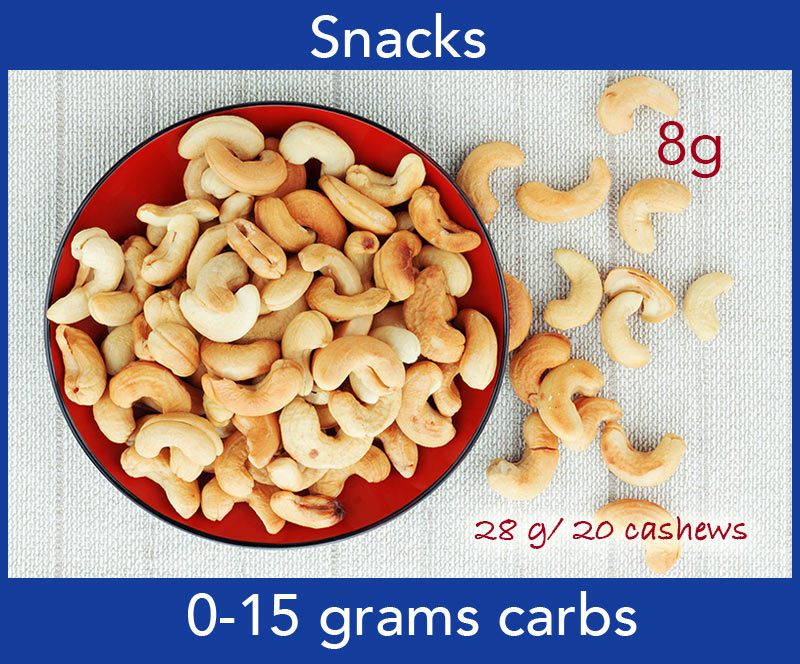Have you ever ordered an iced coffee with cashew milk rather than cream or enjoyed a hearty spoonful of cashew butter instead of peanut butter?
Cashews have been trending for a while now, with new cashew-based products popping up every year!
As nut-based alternatives become more popular, you may wonder which of these foods are diabetes-friendly. Keep on reading and we’ll fill you in.
Nutrition Facts for Cashews
Here’s what you’ll get in a 1oz / 28g serving (16-18 nuts) of whole cashews:
- Calories: 157
- Carbohydrates: 8g
- Fiber: 1g
- Protein: 5g
- Fat: 13g
Yep, cashews contain a lot of dietary fat!
That 13g of fat may be alarming to those who have fallen for the “fat is bad” marketing of the past few decades, but fear not; cashews are actually good for your cardiovascular health!
Over 60% of the fat in cashews is monounsaturated (the heart-healthy kind), making cashews closer to being a “superfood” than a “junk food.” The kind of fat found in tree nuts is not equal to the inflammatory fats found in potato chips and Kentucky fried chicken. Feel free to snack on cashews without stressing!
The triad of fat, protein, and fiber in cashews is a great combination for satisfying hunger, stabilizing blood sugar, and keeping you out of the sugary snack drawer in-between meals.
Cashews also contain antioxidants, vitamins, and minerals to help fight inflammation, regulate nerve function, and support brain health.
That modest 1-oz serving of cashews provides a whopping 20% of your daily magnesium needs, 10% of your daily iron, and 5% of your daily vitamin B6.

Cashews vs. Other Nuts
In general, we love tree nuts for people with type 2 diabetes.
They’re versatile, they’re easy to snack on, and they are nutritional power-houses.
Now, if you look closely at the chart below, you’ll notice that cashews do fall on the higher end when it comes to carbs (along with pistachios).
With this in mind, keep an eye on your portion sizes as you enjoy these moderate-carb nuts, but don’t stress about counting every single pistachio or cashew.

It’s best to enjoy a variety of nuts to cash in on the wide variety of nutrients available – plus it will keep your diet feeling fresh and fun!
Research on Cashews and Type 2 Diabetes
The so-called “healthy fats” in cashews get all kinds of positive press, but what does a “healthy fat” actually mean?
These monounsaturated and polyunsaturated fats have anti-inflammatory effects in the body and can even reduce your risk of developing cardiovascular diseases.
Here’s what the research says about how tree nuts, including cashews specifically, can boost human health:
- Research finds that the nutrients in tree nuts may be a protective factor against heart disease. The dietary fiber, antioxidants, alpha-linolenic acid (an omega-3 fatty acid), and monounsaturated fats found in nuts have been shown to protect against inflammation and insulin resistance.
- Studies also show that tree nuts also make a healthy snack that can influence weight loss! Eating tree nuts in place of traditional snack foods can increase your intake of nutrients like anti-inflammatory omega-3s and dietary fiber while reducing your intake of added sugars and empty calories.
- Tree nuts have also been found to increase glycemic control in people with type 2 diabetes. Diets emphasizing tree nuts were associated with significantly lower HbA1c and fasting blood sugar levels compared to standard diets that didn’t emphasize tree nuts.
- Other research featured an 8-week trial in which participants with type 2 diabetes added cashews to their daily diets. By the end of 8 weeks, the group that added cashews to their diets saw decreases in insulin levels, better insulin sensitivity, and lower LDL (“bad”) cholesterol levels.
- Finally, research has found that several compounds in cashews may increase glucose uptake by skeletal muscles – this is good news for people who want to lower high blood sugar levels through their diet and lifestyle!
Guidelines for Cashews and Type 2 Diabetes
It should be clear by now that we love tree nuts, including cashews. They taste great and they’re great for you!
But, with so many cashew-based products on the market these days, which ones get a pass?
Whole Food Cashews
When possible, go for whole-food cashews. A cashew nut (seasoned or plain) is the least processed option on this list.
They’re good for snacking, trail mix, and adding to stir-fries and salads.

Cashew Butter
This “cousin” to peanut butter is thick, creamy, and full of nutrients.
Most unsweetened cashew butters contain anywhere from 8-10g of carbs per 2 tbsp serving. This is just north of traditional peanut butter that contains 6-8g of carbs.
Cashew butter is a good example of a “sometimes” food. It’s OK in moderate amounts (be mindful of serving size) but you can easily rack up a mountain of carbs by eating straight from the jar and not keeping track of your spoonfuls.
Cashew Milk
Similarly to almond milk, cashew milk is a good low carb dairy alternative. Most brands of unsweetened cashew milk contain only 1-4g of carbs per cup.
Stay away from sweetened cashew milk (which may contain over 10g of carbs), but feel free to use the unsweetened kind in baking, smoothies, and breakfast foods.
Cashew Cheese
“Fake” cheeses often contain filler ingredients like gums, starches, and cheap plant oils.
While cashew-based cheese and cream cheese aren’t necessarily a no-go right off the bat, try to eat these processed foods sparingly in your diet.
And as always, check the nutrition label to see the number of carbs per serving and look for options with as few ingredients as possible.

Cashew Yogurt
Dairy-free yogurts usually contain quite a few carbohydrates. Even unsweetened cashew yogurt may have 9-10g of carbohydrates per serving (while sweetened versions may contain upwards of 15-20g).
It’s OK to indulge in unsweetened dairy-free alternatives yogurt every once in a while, but be sure to include many less-processed, nutrient-dense options in your breakfast meal plans.
Here are some great low-carb breakfast ideas for inspiration!

Leave a Reply